REDSTONE ARSENAL, Ala. -- In the Army, one strong leader leads to another.
And so it is at the Space and Missile Defense Command/Army Forces Strategic Command, where Lt. Gen. Kevin Campbell's visionary leadership is making way for Lt. Gen. Richard Formica - "the right person at the right time to lead this challenging organization," said Gen. Peter Chiarelli, the vice chief of staff of the Army.
Chiarelli's comments came during a change of command and retirement ceremony Dec. 15 in Bob Jones Auditorium, during which Campbell expressed his gratitude for a 37-year career with the Army and welcomed the organization's recently promoted lieutenant general. Formica assumed from Campbell command of SMDC/ARSTRAT as well as the Joint Functional Component Command for Integrated Missile Defense, all of which are subordinate commands of the Army's Strategic Command.
To Formica, Chiarelli said "I look forward to working with you on issues of great importance to the nation and to the Army." To Campbell, he said, "you are one of the best I've worked with. You are a strategic thinker, visionary and jack of all trades ... This very abbreviated list doesn't skim all that Kevin has accomplished on behalf of our nation and our Army."
During his four years as commander of SMDC/ARSTRAT, Campbell's accomplishments have included managing the Army's cyber functions prior to the Army's Cyber Command being activated in May 2010, overseeing the command's headquarters move to Redstone, assuming operational responsibility for new communications satellites, getting the Army's pilot satellite - the SMDC-ONE - into orbit, and overseeing the command's immense contributions to the ongoing campaigns in Iraq and Afghanistan.
SMDC/ARSTRAT conducts space and missile defense operations and provides planning, integration, control and coordination of Army forces and capabilities in support of the Strategic Command; serves as the Army specified proponent for space, high altitude, and ground-based midcourse defense; serves as the Army operational integrator for global missile defense; and conducts mission-related research and development.
Speaking to an audience of family, friends and co-workers, and Army and community leadership, Campbell asked them to excuse any oversights he might make during his comments, joking "this is the first time in my life I've ever spoken in a retired status."
Campbell expressed his gratitude, saying that throughout his Army career he has focused his work "on the mission, the people and our country above all else."
He and his wife, Kathy, along with their two grown children, enjoyed their years as part of the Army family. Daughter Erin, a physical therapist, is married to Air Force Capt. Jonathan Bott while son Scott is a U.S. Coast Guard certified ship captain.
"What wonderful company to keep for so many years. We are blessed Americans ... The Campbells have much to be thankful for, primarily to serve with men and women who are in the Army for a larger purpose," he said.
"This is a unique group of people who pass up some of the American dream to protect freedom for Americans. While most Americans are focused on life, liberty and the pursuit of happiness, and other high ideas, Soldiers are focused on duty, honor, country. We've been in distinguished company for 37 1/2 years. As we say in the South, we've been in tall cotton."
Campbell said the past nine years of combat operations has put the non-commissioned officer in the forefront of the Army. Because of that, Campbell said the first decade of the 21st century should be named the Decade of the NCO.
Mentioning SMDC/ARSTRAT Command Sgt. Maj. Larry Turner, Campbell said Turner wears eight overseas service bars on his uniform, representing four years in combat operations around the world.
"He is the poster NCO," Campbell said. "We owe much to our non-commissioned officers."
Also during that decade, the Army has faced its most stressing challenges, including fighting an adaptive adversary, sending Soldiers on multiple deployments, transitioning the organization to meet today's threats, and managing changes caused by the Base Realignment and Closure Act.
"These things are all impacting a force nearly simultaneously. But there is no implosion in the Army," Campbell said. "We have a trained and ready, well-cared for force that knows how to stay on course, and remains grounded in the Army values and warrior ethos."
The civilian work force of SMDC/ARSTRAT, working in the areas of both operational, and research and development missions, have provided the Army and its Soldiers with "one more capability to take on a tough and determined enemy," Campbell said. "You're making a difference in the Army and specifically on the battlefield of Iraq and Afghanistan."
Campbell went on to say that the Joint Functional Component Command for Integrated Missile Defense has worked hard to "knit seams between combatant commands."
Expressing his family's pride to have served with the Army, Campbell said "we leave much better people because we've served with such good people for 37 years. Army strong!"
Campbell's farewell comments touched on a sentimental chord, and were echoed in Formica's expressed appreciation for his new assignment.
"(Formica's wife), Diane, and I are thrilled to join this community and get on your team," said Formica, who was promoted to lieutenant general in a ceremony prior to the change of command.
"I accept today, without reservation, the responsibilities inherent in command of SMDC/ARSTRAT and JFCC-IMD. I recognize the unique and substantial role these commands have in our Army. This is a great command with a terrific reputation across the Army."
During the past year, Formica has served as a special assistant to the Army's chief of staff. He served as commander of the Combined Security Transition Command, Afghanistan, in Operation Enduring Freedom from December 2008 to November 2009.
Formica will focus his command leadership on "providing trained and ready space and missile defense forces, building future space and missile defense forces, and integrating space and other relative technology" to provide the best in integrated air and missile defense capability to the war fighter. That integration role is part of the JFCC-IMD mission.
"We are all integrated members of a team committed to and focused on those who are deployed in harm's way," he said. "With units, Soldiers, sailors, airmen, Marines and civilians forward-stationed ... the sun never sets on SMDC, ARSTRAT or JFCC-IMD."
Mentioning SMDC/ARSTRAT partners based at Redstone Arsenal - including the Missile Defense Agency, Army Materiel Command, Aviation and Missile Command and Program Executive Office for Missiles and Space - along with other organizations and industry partners, Formica said he appreciates the value of these relationships toward the SMDC/ARSTRAT mission.
He also talked about the dedication of the 1,000 civilians and 900 military employees of SMDC/ARSTRAT, and said, "Diane and I are proud to join your team and look forward to serving alongside you."
SMDC/ARTSTRAT can trace its beginnings to December 1962, when the command achieved the first successful intercept of an intercontinental ballistic missile re-entering the atmosphere, Chiarelli said. That interception was made with a Nike Zeus missile.
"All that's been accomplished since then in hit-to-kill technologies, sensor and radar development and short-, medium- and long-range intercept capabilities, it's absolutely remarkable," the four-star general said.
Speaking to SMDC/ARSTRAT leadership as well as to all its employees, Chiarelli said, "Your work enhances war fighters' situational awareness. You have been extremely busy conducting an incredible mission in support of our nation and our Army."
Chiarelli mentioned President Ronald Reagan's 1983 remarks about the importance of nations working together, saying, "Reagan sought to achieve peace through strength. This is your legacy as well."
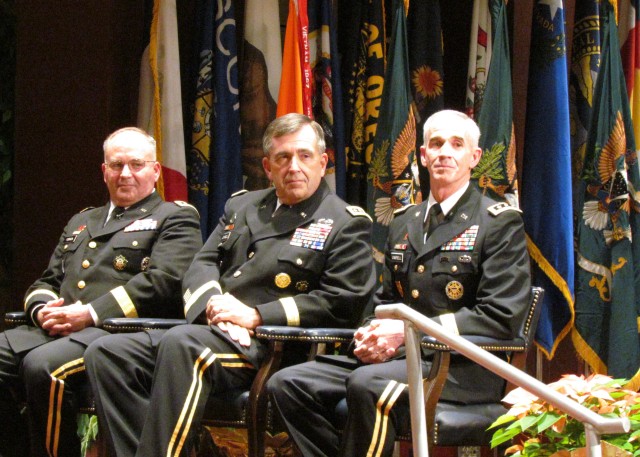
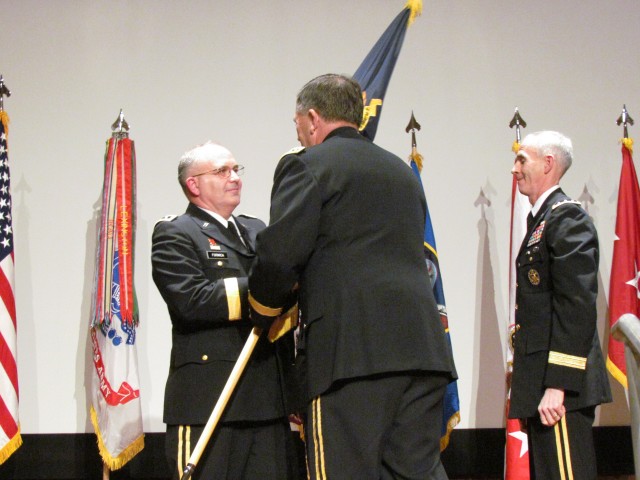
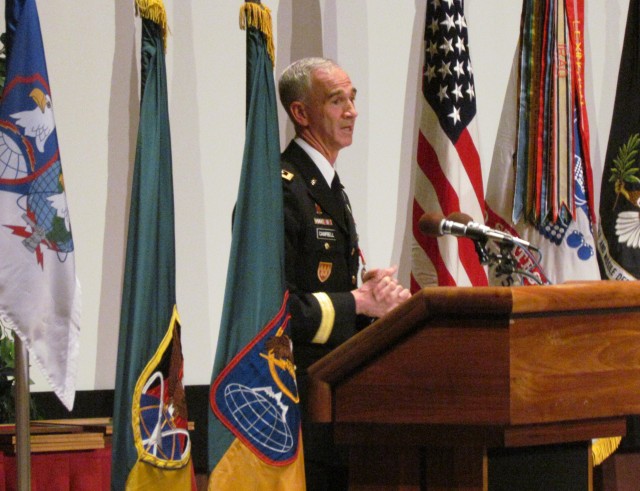
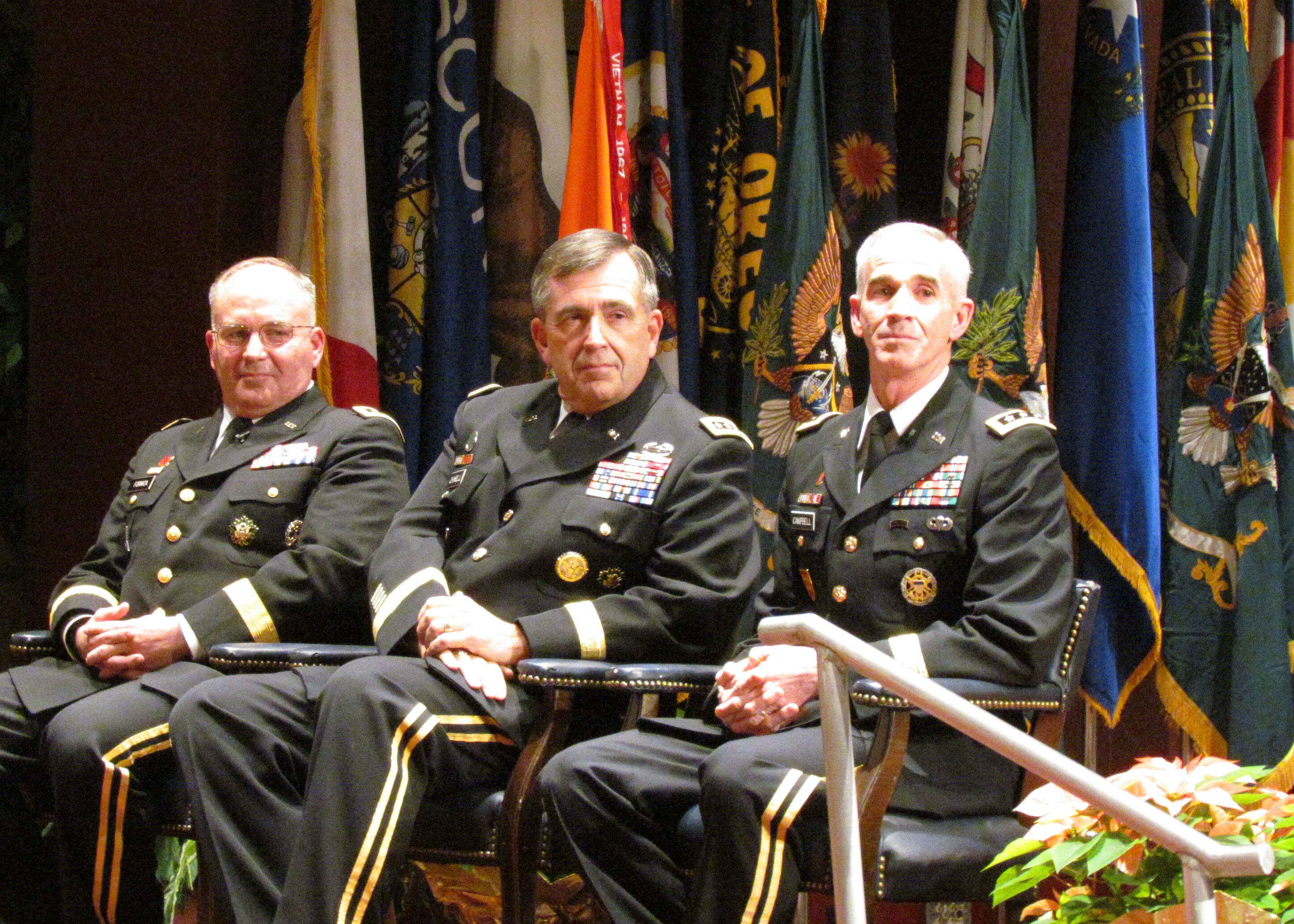
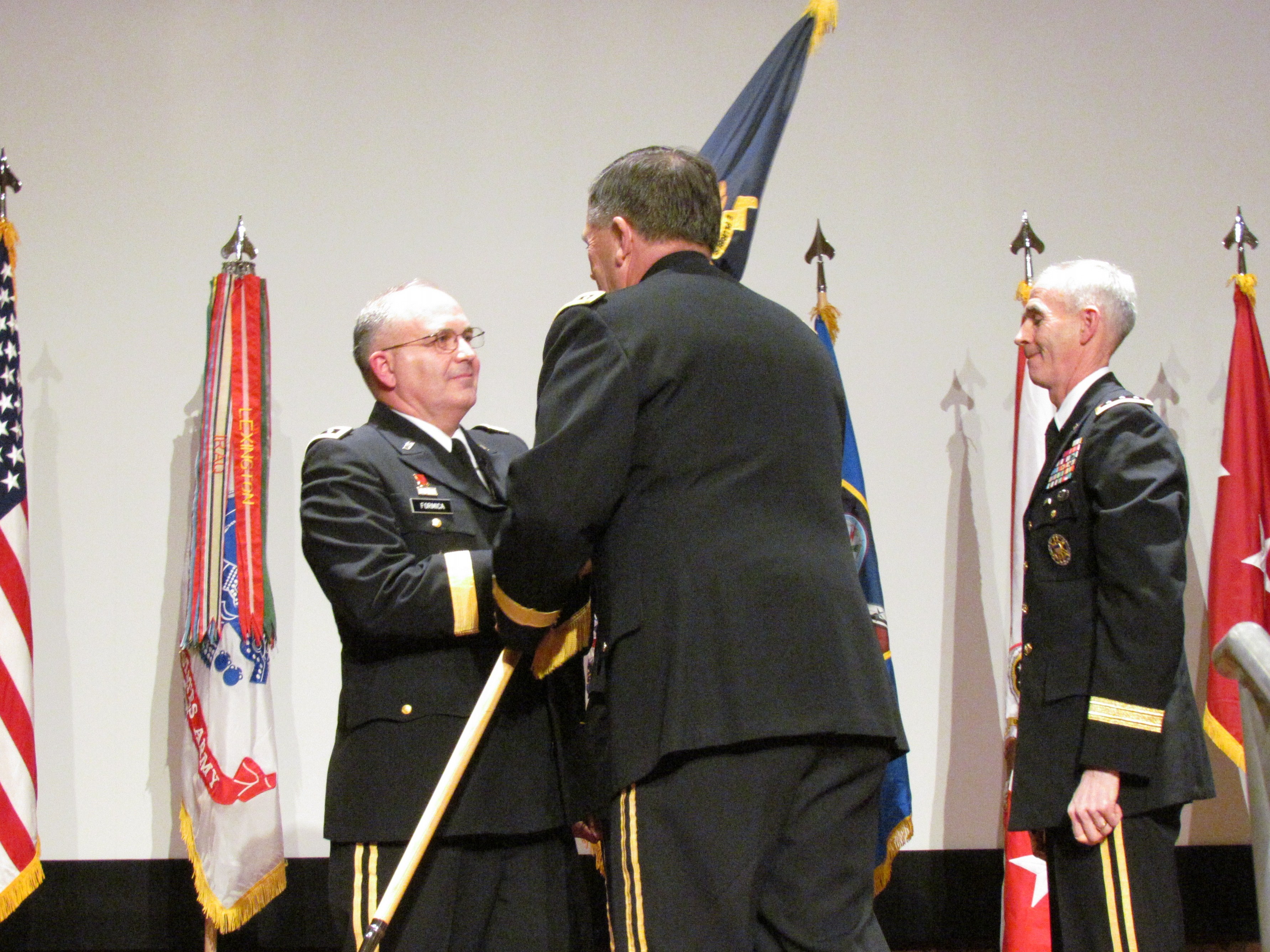
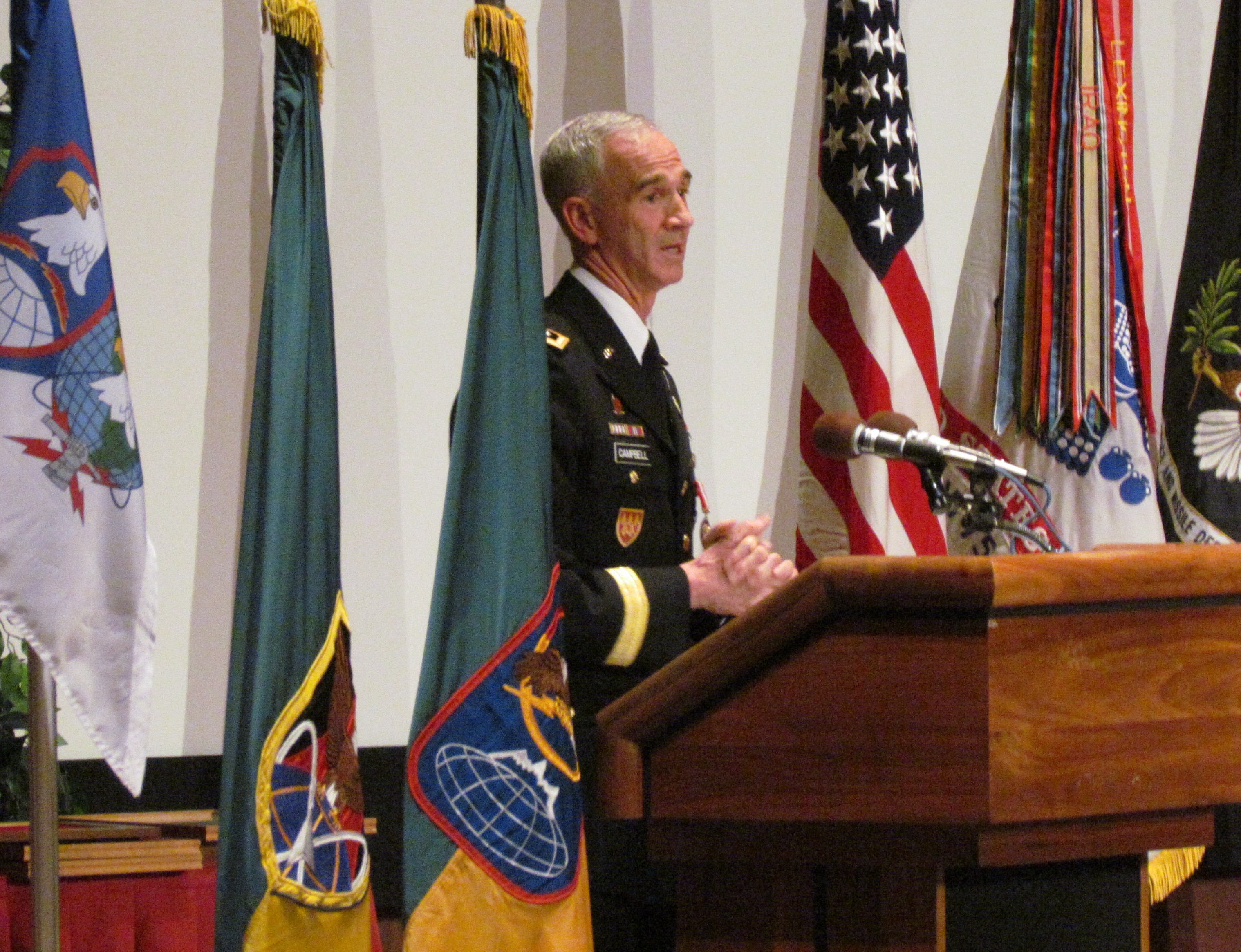
Social Sharing